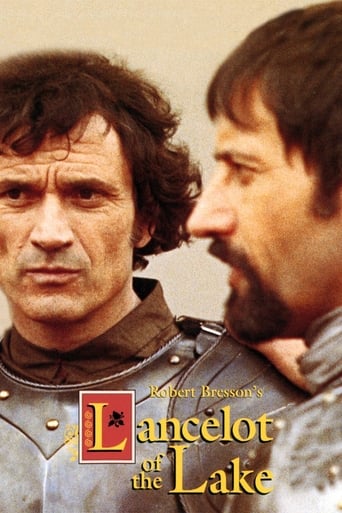geoffrey-landis
This film is an attempt to remove the romance from the Arthur legend. Even the titular love affair between Lancelot and Guenivere is portrayed with no show of emotion and no physicality, with the characters for the most part never even looking at each other, never smiling. Unfortunately, the director not removes romance, but also removes logic, plot, and motivation. The result is not merely unromantic, but muddy-- with no explanations, it is nearly impossible to figure out what is going on, or why the characters are doing what they are. The director sure was enthralled with the (not realistic) armor, though-- the characters wear it even indoors! And Camelot (never referred to by name( seems to consist of about an acre of land, containing little except about eight knights, a castle that is never seen from outside, a two-story hut, and a dozen tents. Except for the beginning scene, with knights killing each other with spectacular (and completely unrealistic) amounts of spraying blood, all of the fight scenes take place offstage. The joust scene, central to the movie, is filmed by showing Lancelot picking up his lance, the flag of the opponent being raised, and then the horse's legs are filmed as he actually tilts at the opponent. Even in the movie's climax, with archers in trees (who came out of nowhere-- no antecedent in the film for archers) firing at knights on horseback, the arrows are shown only as hitting trees-- apparently the archers are lousy shots. I'd rate this one as muddy and confused-- pass it up.
dumontaaron55-1
**** (out of four) By Aaron Dumont Despite what you've heard, Lancelot du Lac remains one fo the most meditational, multi-faceted and cinematic movies ever made; this bare-bones, minimalist interpretation of the legend of Arthur, a late-period Bresson film that teeters dangerously between 'gorgeous' and 'tedious', is a stark, modernist beauty, a masterfully-structured transformation of the Arthurian legend and all its absurdities, its ridiculous blemishes, its lack of insight and apathy, and possibly all the other countless, pompously glamorous counterparts and adaptations--mostly cinematic--of the legend, as well.From the opening scene to the closing shot, Lancelot du Lac purposefully closes out all "emotions" (aka overacting and overposing) and any "enchanting" (read: astonishingly depthless and distracting) features of the original while calmly, serenely gliding through the anonymity of death--however, though seemingly of work of pessimism, Lancelot du Lac is as far from; it incorporates not only the agonies and facelessness of war, it succeeds in its transcendent, near-reverential attempt to give a reason to all the coldness and brutality--the camera moves along with phantom-like eyes of disillusionment and of loving craft, yet still remains almost purely physical, savage and kinetic much of the time. While most movies would simply remain boring as hell right from Step 1, Bresson, knowing an actual thing or two about cinema, meticulously emphasizes the texture, shape and form of the movie, creating a sprawling canvas of transmuted life, space, and humanity, while still reserving bridges and swirls of poetry and liberation.Bresson was indeed a skilled craftsman of the cinematic form. And, much like the rest of his oeuvre, he claws past every little insignificant bit and plot piece that are oh-so-conveniently (and, of course, conventionally) used, and goes straight for the most basic, most shamefully true, most resonant instincts; compulsion, meaningless bloodshed and the need to stay alive. Bresson never compromised; every one of his movies need devoted, undivided detention to grab hold of. And, he manages to sustain a movie with that (and an incredible one, too)--which should at least be respected, considering how that shouldn't even be possible in cinema.Though of course, Lancelot du Lac is difficult, to say the least--a fantasy without fantasy, a spectacular tale told in the mode of guilt and sensitivity. However, that's also what makes it so stunning--it is the work of someone who has given up on the petty, masturbatory pizazz of film-making, and of a genuine, fully-bloomed artist in their prime.
Jonathan Ives
Words fail me about this film. I don't wish to repeat what others have said, beyond the fact that I thought utterly dire and only works as a parody of an art film.I don't think it's particularly beautiful to watch. I got sick of white walls, white tents, basically any excuse to have no scenery.Even the horses performances are awful. The same neighing sound effect is heard hundreds of times ("Frau Blucher!"), a jousting scene only shows the horses legs, and at the films "climax" a horse with an arrow in it's head seems quite happy and clearly wants another sugar lump.It was neither as accurate as Monty Python and the Holy Grail , nor as funny as Excalibur .The emperor has no clothes on ( or maybe just some tights )
hackberry1
Truly one of the most inadvertently funny movies I have ever seen. Opens with way too many nearly identical scenes of knights in full plate armor galloping toward each other in the forest and knocking each other off their horses.Back at the castle, the knights are shown lounging around, eating, and engaging in conspiratorial whisperings--while still in full armor! Even the love scenes! All dialogue is in that French monotone barely above a whisper, whether declaring passionate love or discussing the weather, that seems to be meant to represent nothing more than the profound sensitivity of French culture.Unlike some Americans, I don't hate the French--their culture and outlook are a bright spot in our lockstep world--but the pomposity and self-importance of this movie are over the top.


